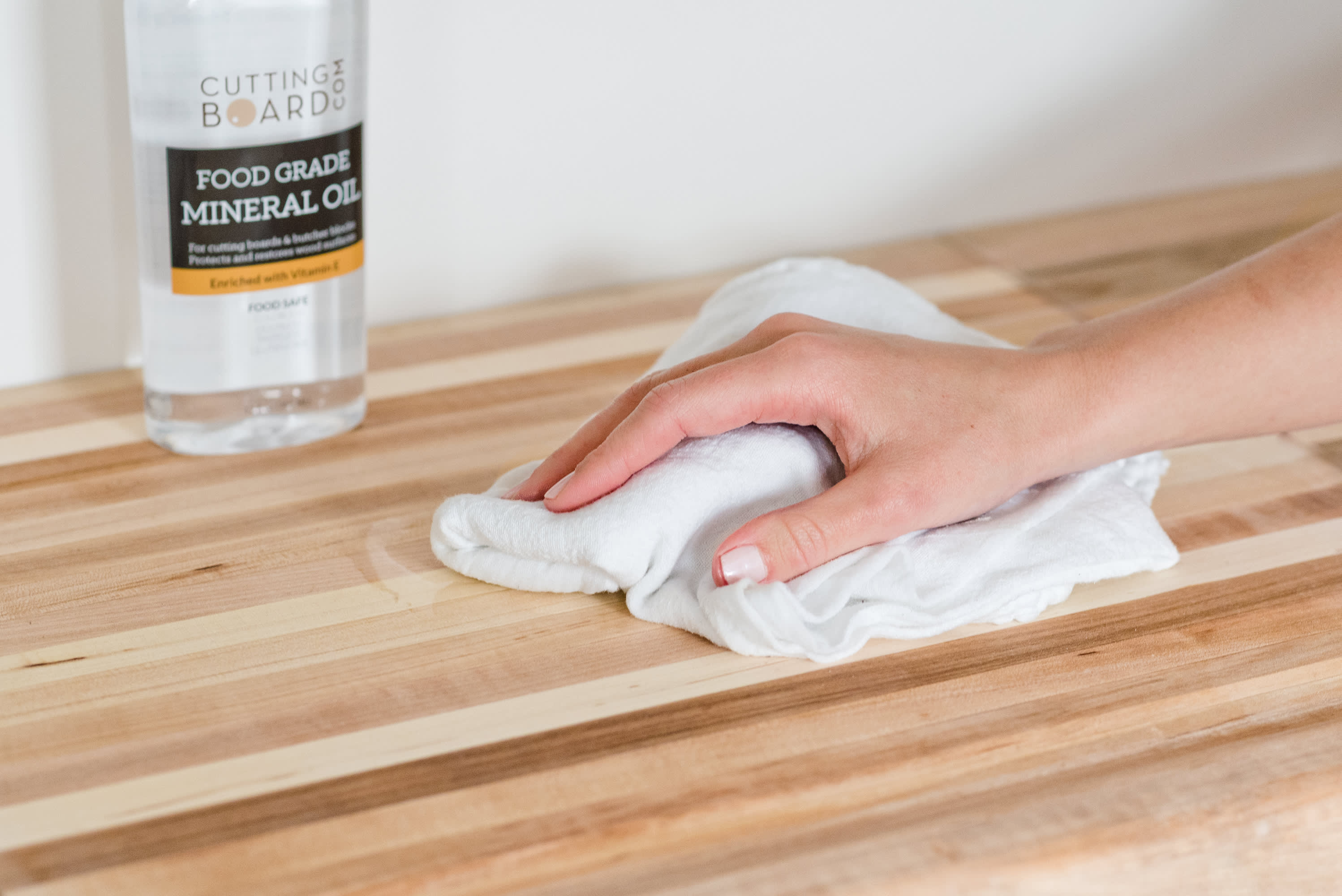Butcher block countertops offer a warm and natural aesthetic to kitchens, providing a sturdy and functional surface for food preparation. To maintain their beauty and durability, regular oiling is essential. This guide will explain why oiling is important, how to do it properly, the benefits of regular maintenance, and common mistakes to avoid.
Why Oiling is Essential for Butcher Block Countertops?
Protection Against Moisture
One of the primary reasons for oiling butcher block countertops is to protect the wood from moisture. Wood is porous and can absorb water, which can cause it to swell, warp, or crack. Oiling creates a protective barrier that prevents water and other liquids from penetrating the wood, thus maintaining its integrity and appearance.
Enhancing Durability
Regular oiling enhances the durability of butcher block countertops. The oil penetrates deep into the wood fibers, hardening them and making the surface more resistant to everyday wear and tear. This treatment helps the countertop withstand the rigors of chopping, slicing, and other kitchen activities without getting easily damaged.
Maintaining Appearance
Oiling keeps butcher block countertops looking their best. It brings out the natural grain and color of the wood, giving it a rich, polished look. Over time, untreated wood can dry out and become dull. Regular oiling not only preserves the aesthetic appeal but also adds a layer of shine that makes the countertop visually appealing.
Preventing Bacterial Growth
A well-oiled butcher block countertop is more hygienic. The oil fills the wood’s pores, making it less hospitable to bacteria and mold. This is especially important in kitchen environments where the countertop comes into contact with food. Regular oiling ensures the surface remains sanitary and safe for food preparation.
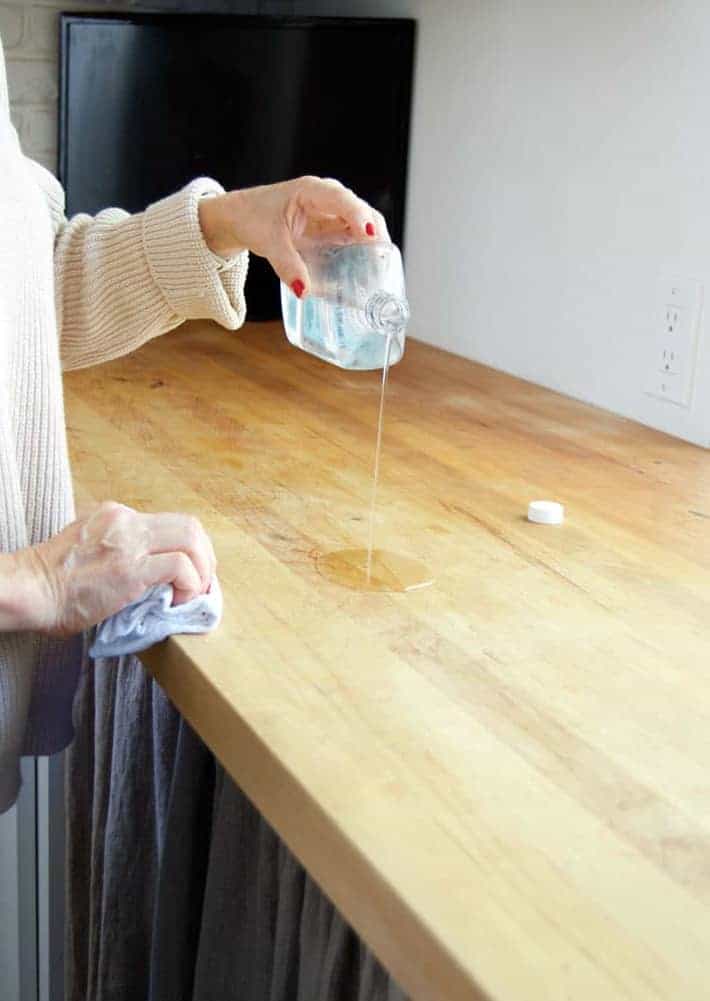
Steps for Properly Oiling Butcher Block Countertops
Choosing the Right Oil
Selecting the appropriate oil is crucial for the maintenance of butcher block countertops. Food-safe oils like mineral oil, tung oil, and linseed oil are recommended. Mineral oil is a popular choice due to its availability, affordability, and ease of application. Ensure that any oil used is food-grade to avoid contamination.
Preparing the Surface
Before oiling, the countertop must be thoroughly cleaned. Use a mixture of mild dish soap and warm water to remove any dirt, grease, or food particles. Rinse well and dry the surface completely. Sanding the countertop lightly with fine-grit sandpaper can also help remove any rough spots and open up the wood’s pores, allowing better oil absorption.
Applying the Oil
Pour a generous amount of oil directly onto the countertop and spread it evenly using a clean, lint-free cloth or a soft brush. Work in the direction of the wood grain, ensuring that the oil covers the entire surface, including the edges. Allow the oil to soak in for at least 15-20 minutes. For best results, apply multiple coats, allowing each coat to penetrate before applying the next.
Finishing Up
After the final coat has soaked in, wipe off any excess oil with a clean cloth. Leaving excess oil on the surface can make it sticky and attract dust and debris. Buff the surface with a dry cloth to achieve a smooth, polished finish. Let the countertop dry completely before using it to ensure the oil is fully absorbed and the surface is not greasy.

Benefits of Regular Maintenance
Longevity of the Countertop
Regular oiling significantly extends the lifespan of butcher block countertops. By maintaining the wood’s moisture balance and preventing it from drying out, oiling helps avoid cracks and splits, ensuring the countertop remains functional and beautiful for many years.
Cost-Effective Solution
Oiling is a cost-effective way to maintain butcher block countertops. It prevents the need for expensive repairs or replacements by keeping the wood in good condition. Investing in regular oiling is a small cost compared to the expense of fixing extensive damage caused by neglect.
Aesthetic Appeal
Consistent maintenance through oiling keeps the countertop looking fresh and new. The natural beauty of the wood is preserved, and its rich tones are enhanced. Regular oiling ensures that the countertop remains a focal point in the kitchen, adding warmth and elegance to the space.
Improved Hygiene
Maintaining a well-oiled butcher block countertop contributes to a more hygienic kitchen environment. The oil’s protective barrier reduces the risk of bacterial and mold growth, making it safer for food preparation. This is particularly important for countertops that are frequently used for chopping and handling raw foods.
Common Mistakes to Avoid
Using the Wrong Oil
One of the most common mistakes is using the wrong type of oil. Non-food-safe oils, such as motor oil or certain vegetable oils, can be harmful and cause the wood to become rancid. Always use food-safe oils specifically designed for butcher block countertops to ensure safety and effectiveness.
Not Cleaning Properly Before Oiling
Failing to clean the countertop thoroughly before oiling can lead to poor results. Dirt, grease, and residue can prevent the oil from penetrating the wood properly. Always clean and dry the countertop thoroughly before applying oil to ensure optimal absorption and effectiveness.
Applying Too Much Oil
While it’s important to apply enough oil to saturate the wood, using too much can leave the surface sticky and attract dust. Excess oil should be wiped off after each application. Multiple thin coats are more effective than a single heavy coat and result in a smoother finish.
Infrequent Oiling
Neglecting regular oiling can lead to the wood drying out and becoming susceptible to damage. Establish a regular maintenance schedule based on the usage of your countertop. For heavily used countertops, monthly oiling may be necessary, while less frequently used surfaces can be oiled every few months.

How often should I oil my butcher block countertop?
The frequency of oiling depends on how often you use your countertop. For heavily used surfaces, monthly oiling is recommended. For less frequently used countertops, every three to six months is sufficient. You can also perform a water test: if water droplets do not bead up on the surface, it’s time to re-oil.
Can I use coconut oil to oil my butcher block countertop?
While some people use coconut oil for butcher block countertops, it is not the best choice. Coconut oil can go rancid over time, leading to unpleasant odors. It’s better to use mineral oil or other food-safe oils specifically designed for wood treatment, as they do not spoil and are more effective in maintaining the countertop.
What should I do if my butcher block countertop feels sticky after oiling?
If the countertop feels sticky after oiling, it likely means that excess oil was not wiped off. To fix this, wipe the surface with a clean, dry cloth to remove any remaining oil. If the stickiness persists, clean the surface with a mixture of mild dish soap and warm water, then dry thoroughly and reapply a thinner coat of oil, ensuring to wipe off any excess.
Is it necessary to sand the countertop before each oiling?
Sanding is not necessary before each oiling unless the surface is rough or damaged. However, lightly sanding the countertop occasionally can help remove any imperfections and open up the wood’s pores for better oil absorption. Use fine-grit sandpaper and clean the surface thoroughly after sanding.
Can I use my butcher block countertop immediately after oiling?
It is best to wait until the oil is fully absorbed and the surface is dry before using your butcher block countertop. This usually takes about 24 hours. Using the countertop too soon can result in oil transferring to food and other items, as well as a less effective protective barrier. Allowing adequate drying time ensures the oil has properly penetrated and hardened the wood.
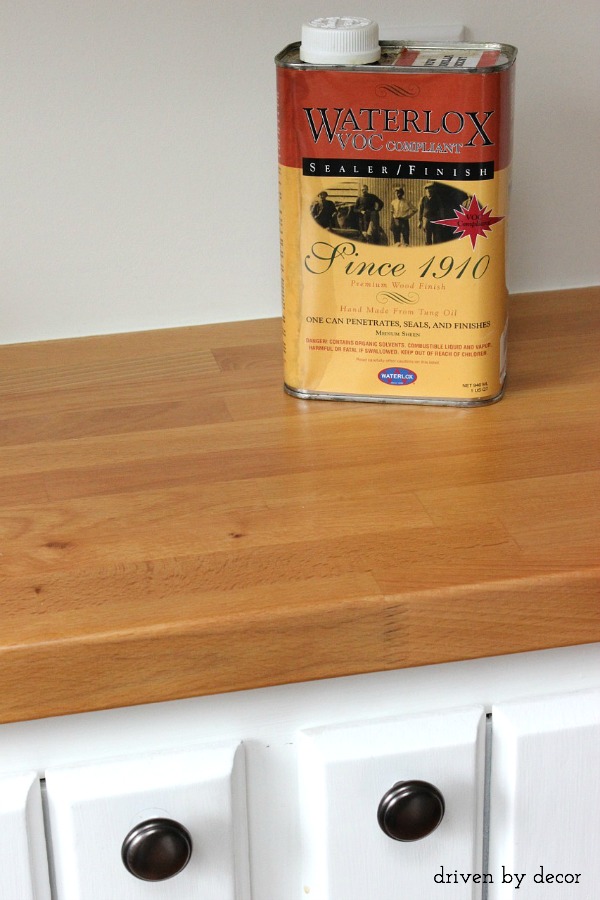
Butcher Block Countertops
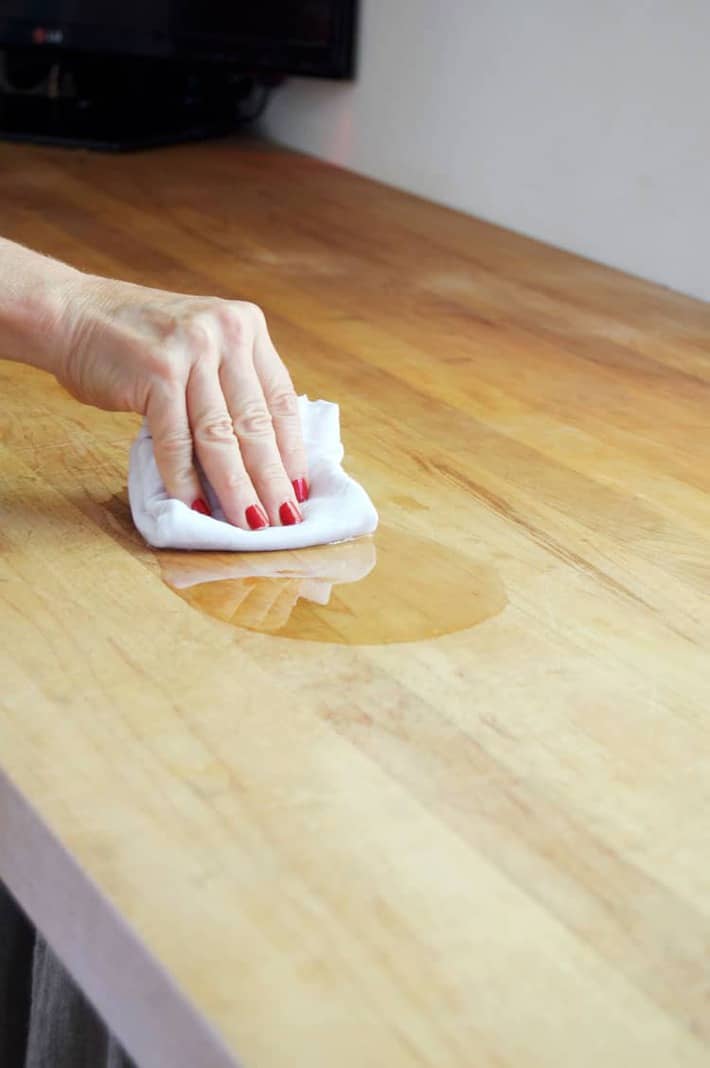
How to Oil Butcher Block Countertops

My Butcher Block Countertops, Two Years Later – Domestic Imperfection
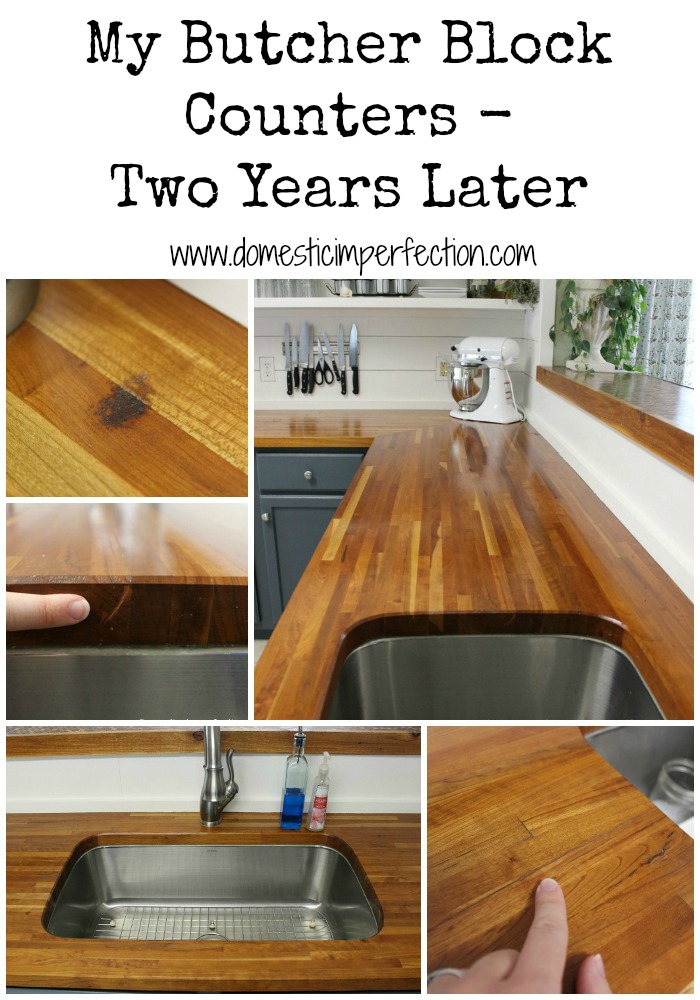
How to Make a Butcher Block Countertop Food Safe – Hardwood
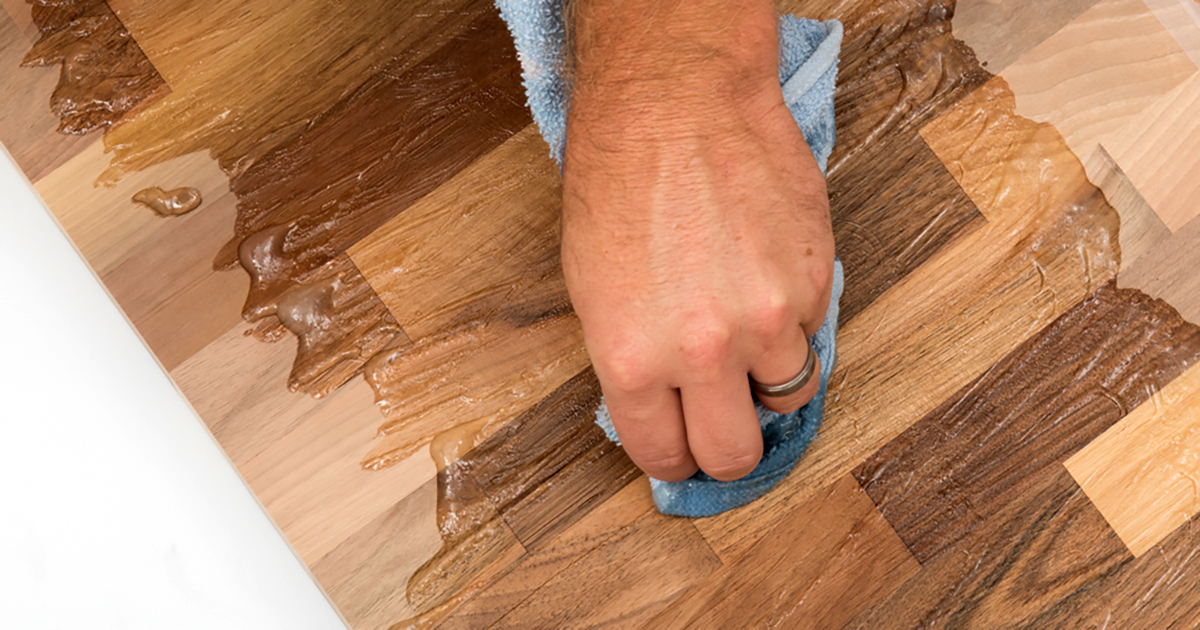
HOUSE*TWEAKING
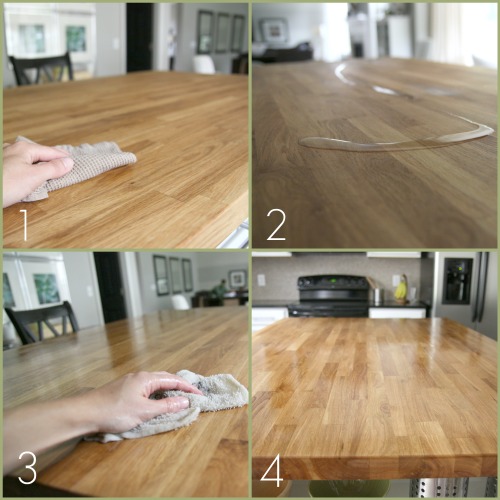
Related articles:
- Island Butcher Block Countertops
- How To Care For Butcher Block Countertops
- DIY Butcher Block Countertops
- Farmhouse Butcher Block Countertops
- Kitchen Designs With Butcher Block Countertops
- Sanding Butcher Block Countertops
- Butcher Block Countertops With White Cabinets
- Build Your Own Butcher Block Countertop
- Butcher Block Countertop With Tile Backsplash
- How To Stain Butcher Block Countertops
